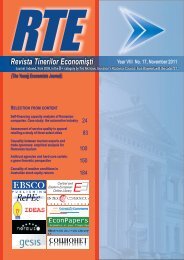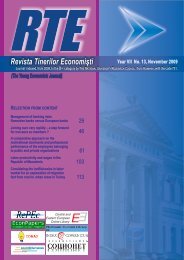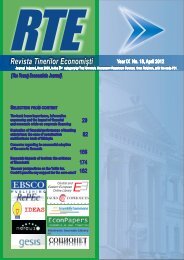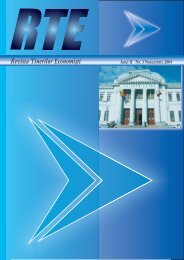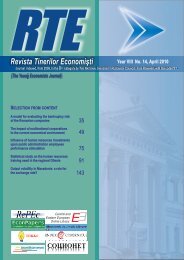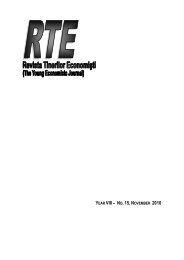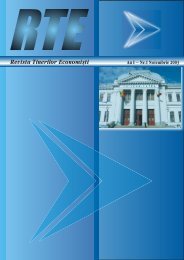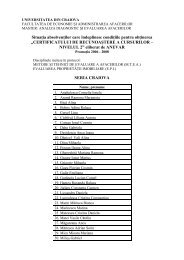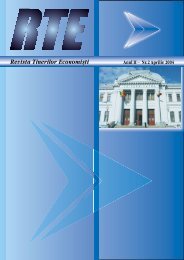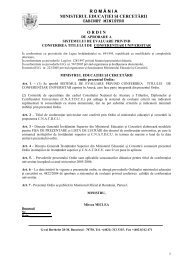Revista Tinerilor Economiºti (The Young Economists Journal)
Revista Tinerilor Economiºti (The Young Economists Journal)
Revista Tinerilor Economiºti (The Young Economists Journal)
You also want an ePaper? Increase the reach of your titles
YUMPU automatically turns print PDFs into web optimized ePapers that Google loves.
Business Statistics – Economic Informatics<br />
information on weather-related variables provides any statistically significant<br />
information about returns. It is assumed that the estimated coefficients on the lagged<br />
weather-related variables are statistically indifferent from zero, as a group indicates<br />
there is no causality between two series (Gujarati 2001; 621).<br />
<strong>The</strong> values of F statistics suggest that, with the exception of humidity, weather<br />
variables do not cause S&P/ASX200 Index returns. <strong>The</strong> results in Table 4 indicate that<br />
only humidity affects S&P/ASX200 Index returns at a 10 per cent level of significance.<br />
Table 4. Granger Causality Test Results (1 Lag)<br />
Null Hypothesis: Obs F-<br />
Statistic<br />
171<br />
Probabilit<br />
y<br />
TEMPERATURE does not Granger Cause ASX200 RETURN 3679 0.19142 0.66177<br />
QUALITY TEMPERATURE does not Granger Cause<br />
ASX2000 RETURN<br />
3679 1.50619 0.21980<br />
WET BULB T does not Granger Cause ASX200 RETURN 3679 1.06009 0.30326<br />
QUAL.WET B does not Granger Cause ASX200 RETURN 3679 1.10131 0.29405<br />
HUMIDITY does not Granger Cause ASX200 RETURN 3679 2.97973 0.08440*<br />
PRESSURE does not Granger Cause ASX2000 RETURN 3679 1.22423 0.26860<br />
VAPOUR PRESSURE does not Granger Cause ASX2000<br />
RETURN<br />
3679 0.18178 0.66987<br />
* <strong>The</strong>re is one way Granger causality from the humidity variable to ASX200 return<br />
series (10%).<br />
In other words, unidirectional causality from humidity Ht to S&P/ASX200<br />
Index returns is indicated if the estimated coefficients on the lagged Ht are statistically<br />
different from zero as a group (i.e. ∑α i ≠ 0 ) and there is causality between the two<br />
series, at least from Ht to S&P/ASX200 Index returns.<br />
5. DISCUSSION<br />
Thus, the results from one way Granger causality suggest that past values of<br />
weather- related variables do not lead market behaviour, with the exception of<br />
humidity. Australia experiences high humidity all year round, but has an extremely<br />
humid wet season from December to April. Under conditions of high humidity, the<br />
body’s efforts to maintain an acceptable body temperature may be significantly<br />
impaired. Blood circulation at the body’s surface cannot shed heat by conduction to the<br />
air and a condition called hyperpyrexia can result. With so much blood going to the<br />
external surface of the body, relatively less goes to active muscles, the brain and other<br />
internal organs. Physical strength declines and fatigue occurs sooner than it would<br />
otherwise. Alertness and mental capacity may also be affected. <strong>The</strong> resulting condition<br />
is called heat stroke or hyperthermia. <strong>The</strong>refore, high humidity could have a negative<br />
impact on physical and psychological conditions and consequently, could influence<br />
investors’ decision-making processes.<br />
However, humidity is an important metric used in forecasting weather. Weather<br />
has always played an important role in the economy and could have a significant impact<br />
on business activities. Every sector of the economy has some sort of weather<br />
sensitivity. Extreme weather events like heat-waves, torrential rain and freezing cold<br />
are bad for business, and bad weather can decrease productivity, lower profits, and<br />
increase the costs of running businesses. However for some companies, bad weather in<br />
the traditional sense of cold, grey and rainy days can be actually be good for business.



